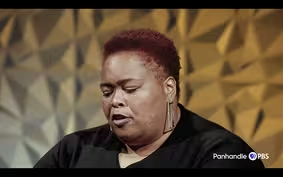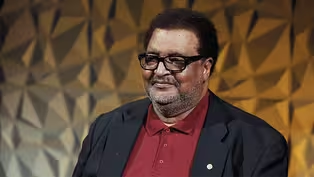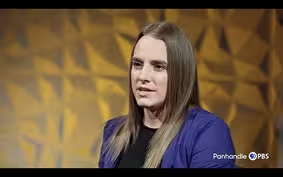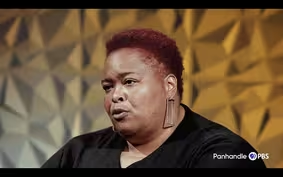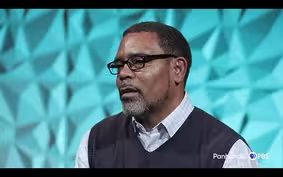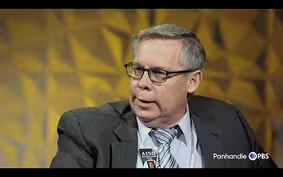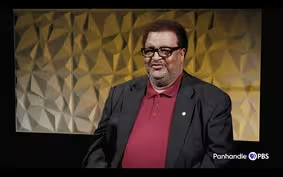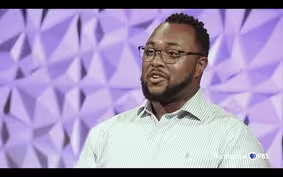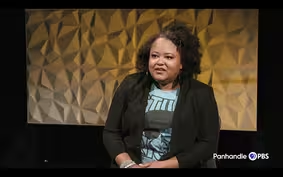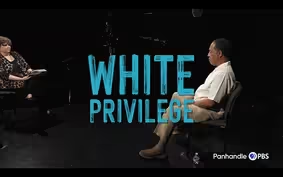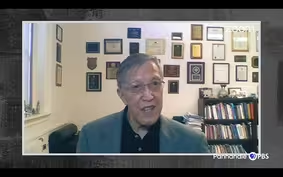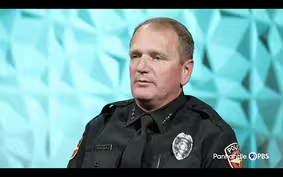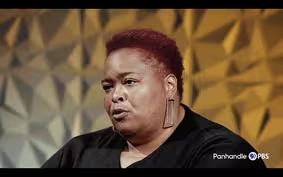Living While Black
8:46
Clip: Season 1 | 9m 24sVideo has Closed Captions
Amarillo's Black and biracial community weighs in on the death of George Floyd.
Amarillo's Black and biracial community weighs in on the death of George Floyd.
Problems playing video? | Closed Captioning Feedback
Problems playing video? | Closed Captioning Feedback
Living While Black is a local public television program presented by Panhandle PBS
Living While Black
8:46
Clip: Season 1 | 9m 24sVideo has Closed Captions
Amarillo's Black and biracial community weighs in on the death of George Floyd.
Problems playing video? | Closed Captioning Feedback
How to Watch Living While Black
Living While Black is available to stream on pbs.org and the free PBS App, available on iPhone, Apple TV, Android TV, Android smartphones, Amazon Fire TV, Amazon Fire Tablet, Roku, Samsung Smart TV, and Vizio.
Providing Support for PBS.org
Learn Moreabout PBS online sponsorshipthat there are laws to this day of killing certain types of animals.
You go to jail for killing, what, an eagle?
Or you kill a deer or something out of season.
And here, we're always in season.
That's gotta stop.
To see an individual lying on the ground, totally helpless with at least three individuals propped up on him.
One of them with a knee against his neck and unable to move, hardly to even voice any words.
And then reiterating not only I cannot breathe but calling for his mother that as a parent, the anguish, the distress, the helplessness and possibly looking at that being my child or my brother, my nephew, my uncle, my friend, and just it cannot be in the United States, the country that other individuals throughout this globe are desiring to get here because it's the land of the free.
And to see this happening, it's just in 2020, unbelievable.
I mean, we believe that we've come so far.
I don't want it necessarily attributed to race, My heart still goes out to that family.
And it still goes out...
When I hear him in my mind, still saying, "Mama," because I am a mother of a Black son.
it's funny to me how people of color and minorities always seem like we're more harmful that we're gonna be more harming to a person.
I think that's what happens when you dehumanize somebody.
When you see us as an animal, maybe you expect the worst.
It, I don't know, I cried.
I cried for a very long time.
Sorry, I'm, but you.. (sighs) I don't know it reminded me of my dad and not that my dad has experienced anything like that, but to see a man of that stature that looks and resembles something of my father was (sighs) a very hard thing to have to witness What did you experience physically here.
- [Meesha] Chills and that's, the one thing I remember is this just overwhelming feeling of like just broken and I don't know why that one was so much more damaging than the rest of them but I guess it was more of an eye-opener because then you look back on the rest of them and you see the videos of all of these people that are resurfacing from two, three, four years ago and they hurt just as much as that one did.
It was just like this, I don't know, this truth bomb had been dropped and it was very hard thing to deal with.
I don't know exactly how it happened but that's not the police man's job to be judge, jury, or an executioner.
That's not what our tax dollars go to.
and people around were like, "Please get off of him."
They were begging for this man's life.
He was begging for his life, but the life of the black man has been reduced to this.
And it was just, I was just moved to a point of emotion so much that I felt like I knew that I had to do something, but I had no idea what to do.
- [Idella] Oh my God.
I couldn't sleep for days.
I said any officer who watched this and see that there's not anything wrong with it, shouldn't even be in this field of work.
We literally witnessed a man get murdered on the on the streets.
And all I have to do is think about it.
I was confused 'cause you know, being an African-American woman have Black kids and boys being in law enforcement.
When I know what's right, our job is to ensure that whoever we have in our custody that their safety is primary.
We're not supposed to be out there murdering people on the street.
He was on the ground.
He was on the ground.
He was subdued.
He was helpless.
And they just kept him in the dust until he suffocated.
The way he died was cruel, inhumane.
I could think of a few other adjectives, but they treated him like he was nothing.
And they kept him on that pavement.
I guess I could say, you know, the pavement instead of the dust, but it was like the dust.
When back during the days of slavery, back during the days of the civil rights movement, they did the same thing.
They kept us in the dust.
- [Patrick] You know, I was seething with anger, anger that this was allowed to occur with onlookers, civilians, law enforcement, angry that these crimes have been perpetuated against African Americans time and time again, and regardless of what video has been displayed to prove on an evidentiary basis, that these heinous acts of police brutality exist in 21st century, I felt like nothing was gonna come of it.
And honestly, personally, still feel like there's gonna be very little to nothing that comes with it.
And it's sad because I love America.
This is my home.
This is my nation.
I'm proud to be an American.
I mean, I wear my flag lapel here with honor.
I know what this country has done, I know what it has the potential to do, and it's just so disconcerting to see that we're still far away from where we ought to be.
"We have that mission, "and we're not gonna stop until we see change now."
and I would say 2020 has just been that, enough is enough.
Like, you have to see me, you have to look at me in my eyes, realize it, understand who I am, and just take worth in me being here, If you're an American, if you love your country, you have to talk about it.
You have to get that understanding.
I think by avoiding the questions and avoiding the topic, that's why we're here today.
Looking like 1960 than 2020, because we've avoided the conversation on both sides, Black and white.
We avoided the hard conversation
Video has Closed Captions
Clip: S1 | 3m 35s | Dr. Derald Wing Sue discusses defining a vocabulary of racism. (3m 35s)
Video has Closed Captions
Clip: S1 | 9m 24s | Amarillo residents discuss their definitions of racism. (9m 24s)
Video has Closed Captions
Clip: S1 | 9m 24s | Amarillo's Black and biracial community weighs in on the death of George Floyd. (9m 24s)
Video has Closed Captions
Clip: 4/15/2021 | 6m 16s | A look at some of the common responses from white people in conversations about race. (6m 16s)
What does it mean to be anti-racist?
Video has Closed Captions
Clip: 4/15/2021 | 3m 11s | What is the difference in being non-racist and anti-racist? Dr. Derald Wing Sue explains. (3m 11s)
Video has Closed Captions
Clip: 4/15/2021 | 3m 15s | Black Amariloans discuss the importance of voting. (3m 15s)
Video has Closed Captions
Clip: 4/15/2021 | 9m 31s | Amarillo residents discuss the best courses of action to take in order to make change. (9m 31s)
Video has Closed Captions
Clip: 4/8/2021 | 1m 36s | The Tascosa High School mascot and flag used to look a lot different. What changed? (1m 36s)
Video has Closed Captions
Clip: 4/8/2021 | 5m 15s | A look at AISD hiring practices and efforts to diversify employees in the district. (5m 15s)
Video has Closed Captions
Clip: 4/8/2021 | 3m 31s | Learn where Park Hills Elementary School got its name. (3m 31s)
Video has Closed Captions
Clip: 4/8/2021 | 3m 18s | Black Amariloans discuss a common piece of advice they got when they were younger. (3m 18s)
Video has Closed Captions
Clip: 4/8/2021 | 11m 16s | A look at the desegregation of Amarillo schools. (11m 16s)
Video has Closed Captions
Clip: 4/1/2021 | 3m 26s | Black Amariloans discuss things they're tired of explaining or being asked. (3m 26s)
Video has Closed Captions
Clip: 4/1/2021 | 10m 48s | A look at the history of segregation at Amarillo College and West Texas A&M University. (10m 48s)
Video has Closed Captions
Clip: 4/1/2021 | 11m 55s | Black Amariloans discuss the aspects of Black history that are often left out. (11m 55s)
White privilege with Dr. Derald Wing Sue
Video has Closed Captions
Clip: 3/25/2021 | 2m 28s | Dr. Derald Wing Sue defines and discusses the concept of white privilege. (2m 28s)
White privilege with Alphonso Vaughn
Video has Closed Captions
Clip: 3/25/2021 | 2m 54s | Alphonso Vaughn discusses what the term "white privilege" means. (2m 54s)
Video has Closed Captions
Clip: 3/25/2021 | 8m 13s | A look at how a flawed system impacts our communities of color. (8m 13s)
Civil Rights vs. Black Lives Matter
Video has Closed Captions
Clip: 3/25/2021 | 9m 57s | A look at the differences in the Civil Rights Movement & the Black Lives Matter Movement. (9m 57s)
Video has Closed Captions
Clip: 3/18/2021 | 7m 14s | Dr. Derald Wing Sue discusses microaggressions. (7m 14s)
Video has Closed Captions
Clip: 3/18/2021 | 12m 32s | A look at the relationship between the Amarillo Police Department and city residents. (12m 32s)
Video has Closed Captions
Clip: 3/18/2021 | 5m 57s | An examination of data that shows Black people are more likely to be stopped by police. (5m 57s)
Providing Support for PBS.org
Learn Moreabout PBS online sponsorship

- News and Public Affairs

Top journalists deliver compelling original analysis of the hour's headlines.












Support for PBS provided by:
Living While Black is a local public television program presented by Panhandle PBS

